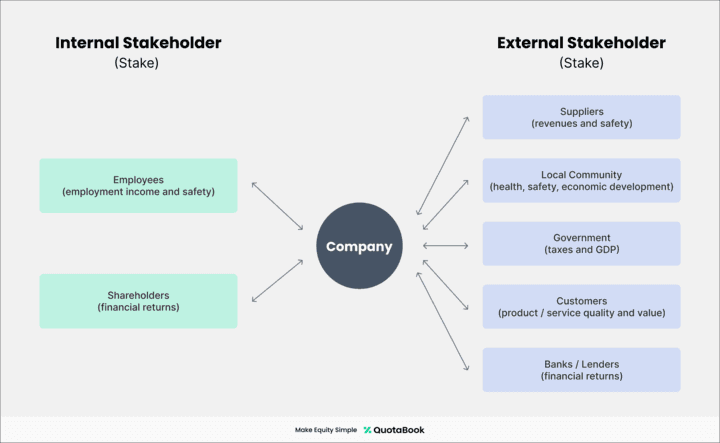Stakeholders
What is a Stakeholder?
A stakeholder is any individual, group, or party that has an interest in a company and can either affect or be affected by the business. Traditionally, stakeholders meant investors, employees, customers, and suppliers. However, with the increasing attention on corporate social responsibility, the concept has been extended to include communities and governments. Stakeholders can be internal or external to an organization, with different interests of their own.
Internal & External Stakeholders
Internal stakeholders’ interest in a company comes through a direct relationship such as employment, ownership, or investment. Employees are certainly internal stakeholders who have a direct stake in the company. Their main concerns are employment income and in case of certain industries, safety. Another example of internal stakeholders is shareholders. They invest capital in the business and expect to earn a return. In case of startups, venture capitalists and accelerators would be the major stakeholders as they support and care a lot about the early-stage companies with an expectation of a big return.
Unlike internal stakeholders, external stakeholders do not have a direct relationship with a company but are somehow affected by the actions and outcomes of the business. Customers, suppliers, government, and local community are all considered external stakeholders. For example, a manufacturing company that emits pollution in its operation can badly affect the local community, and at the same time affected by the government with its regulations.

Stakeholder vs Shareholder
Although stakeholder and shareholder are often confused terms, they are clearly distinguished from one another. Stakeholders are usually bound to a company for the long term and for reasons of need. They want to be treated well, advance in their roles and benefit from the project itself. Meanwhile, shareholders’ priority is more of a financial one like stock prices. They can get out at any time because unlike stakeholders, they do not have such long-term needs. For instance, if a company is performing poorly financially, the vendors in the supply chain might suffer from decreased orders. Similarly, employees of the company might lose their jobs. However, shareholders of the company can simply sell their stocks and limit their losses.
Why Are Stakeholders Important?
Stakeholders are important for many reasons. Internal stakeholders matter because the operations of the business rely on their ability to work together and towards the company’s goals. On the other hand, external stakeholders can affect the business indirectly like customers changing their buying habits, suppliers changing their manufacturing and distribution practices, and governments modifying regulations and laws.
Unfortunately, a common problem for companies with numerous stakeholders is that the various stakeholder interests may not align. In fact, the interests are often in direct conflict. For example, cutting labor costs to maximize profits and enhance shareholder value may lead to resistance from employees. The most efficient companies successfully handle the interests and expectations of all their stakeholders by managing relationships with them for long-term success. QuotaBook can help you with the stakeholders management.
References :
※ Legal Disclaimer
Make Equity Complete — QuotaBook is a global equity management platform with a mission to create an ecosystem for private companies and their investors and employees. Leaving spreadsheets and manual works behind, every stakeholder can connect online and sync crucial data on equity such as cap table or employee stock options. It is the leading platform used by top startups and VCs in Asia.
This piece is written for information purposes only and is not intended as financial or legal advice. QuotaBook does not assume any reliability for dependence on the information provided above.